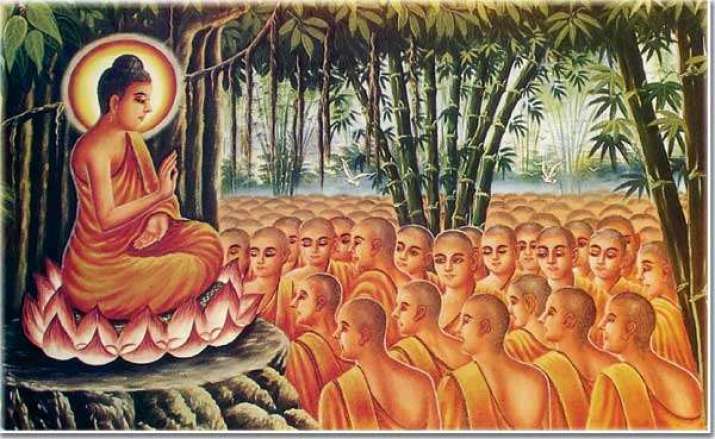Ten Qualities Leading to Buddhahood.
Pāramitā (Sanskrit, Pali) or pāramī (Pāli) is “perfection” or “completeness”. While technically pāramī and pāramitā are both Pāli terms, Pali literature makes far greater reference to pāramī.
The word pāramī derives from parama, ‘supreme,’ and thus suggests the eminence of the qualities which must be fulfilled by a bodhisattva in the long course of his spiritual development. But the cognate pāramitā, the word preferred by the Mahāyāna texts and also used by Pāli writers, is sometimes explained as pāram + ita, ‘gone to the beyond,’ thereby indicating the transcendental direction of these qualities.
In Buddhism, the pāramitās refer to the perfection or culmination of certain virtues and these virtues are cultivated as a way of purification, purifying karma and helping the aspirant to live an unobstructed life, while reaching the goal of enlightenment.
These paramitas are divided into 3: Parami, Upa Parami, and Paramattha Parami. (wikipedia)
Generosity (dana)
This can be characterized by unattached and unconditional generosity, giving and letting go. Giving leads to being reborn in happy states and material wealth. Alternatively, lack of giving leads to unhappy states and poverty. The paradox is that the more we give – and the more we give without seeking something in return – the wealthier (in the broadest sense of the word) we will become. By giving we destroy those acquisitive impulses that ultimately lead to further suffering.
Morality (sila)-virtue, integrity
It is an action that is an intentional effort. It refers to moral purity of thought, word, and deed. The four conditions of sila are chastity, calmness, quiet, and extinguishment, i.e. no longer being susceptible to perturbation by the passions like greed and selfishness, which are common in the world today. Sila refers to overall (principles of) ethical behaviour.
Renunciation (nekkhamma)
Nekkhamma is a Pali word generally translated as “renunciation” while also conveying more specifically “giving up the world and leading a holy life” or “freedom from lust, craving and desires.” In Buddhism’s Noble Eightfold Path, nekkhamma is the first practice associated with “Right Intention.” In the Theravada list of ten perfections, nekkhamma is the third practice of “perfection.”
Wisdom (pañña)
Prajña (Sanskrit) or pañña (Pali) has been translated as “wisdom,” “understanding,” “discernment,” “cognitive acuity,” or “knowledge.” In some sects of Buddhism, it especially refers to the wisdom that is based on the direct realization of the Four Noble Truths, impermanence, interdependent origination, non-self, emptiness, etc. Prajña is the wisdom that is able to extinguish afflictions and bring about enlightenment.
Energy/Strength (viriya)- effort
It stands for strenuous and sustained effort to overcome unskillful ways, such as indulging in sensuality, ill will and harmfulness. It stands for the right endeavour to attain dhyana. Virya does not stand for physical strength. It signifies strength of character and the persistent effort for the well-being of others. In the absence of sustained efforts in practicing meditation, craving creeps in and the meditator comes under its influence. Right effort known as viryabala is required to overcome unskillful mental factors and deviation from dhyana.
Patience (khanti)
Khanti (Pali) has been translated as patience, forbearance and forgiveness. It is the practice of exercising patience toward behavior or situations that might not necessarily deserve it. It is seen as a conscious choice to actively give patience as if a gift, rather than being in a state of oppression in which one feels obligated to act in such a way.
Truthfulness (sacca)
Sacca is a Pali word meaning “real” or “true.” In early Buddhist literature, sacca is often found in the context of the “Four Noble Truths,” a crystallization of Buddhist wisdom. In addition, sacca is one of the ten paramis or perfections that a bodhisatta must develop in order to become a Buddha.
Resolution – determination (adhitthana)
Adhitthana (Pali; from adhi meaning “higher” or “best” plus stha meaning “standing”) has been translated as “decision,” “resolution,” “self-determination,” “will” and “resolute determination.” In the late canonical literature of Theravada Buddhism, adhitthana is one of the ten “perfections” (dasa paramiyo), exemplified by the bodhisatta’s resolve to become fully awakened.
Lovingkindness (metta)
Metta (Pali) or maitri (Sanskrit) has been translated as “loving-kindness,” “friendliness,” “benevolence,” “amity,” “friendship,” “good will,” “kindness,” “love,” “sympathy,” and “active interest in others.” It is one of the ten paramitas of the Theravada school of Buddhism, and the first of the four Brahmaviharas. The metta bhavana (“cultivation of metta”) is a popular form of meditation in Buddhism.
Equanimity (upekkha)
The real meaning of upekkha is equanimity, not indifference in the sense of unconcern for others. As a spiritual virtue, upekkha means equanimity in the face of the fluctuations of worldly fortune. It is evenness of mind, unshakeable freedom of mind, a state of inner equipoise that cannot be upset by gain and loss, honor and dishonor, praise and blame, pleasure and pain. Upekkha is freedom from all points of self-reference; it is indifference only to the demands of the ego-self with its craving for pleasure and position, not to the well-being of one’s fellow human beings. True equanimity is the pinnacle of the four social attitudes that the Buddhist texts call the ‘divine abodes’: boundless loving-kindness, compassion, altruistic joy, and equanimity. The last does not override and negate the preceding three, but perfects and consummates them. – Bhikkhu Bodhi
Photo credit : what-buddha-said




